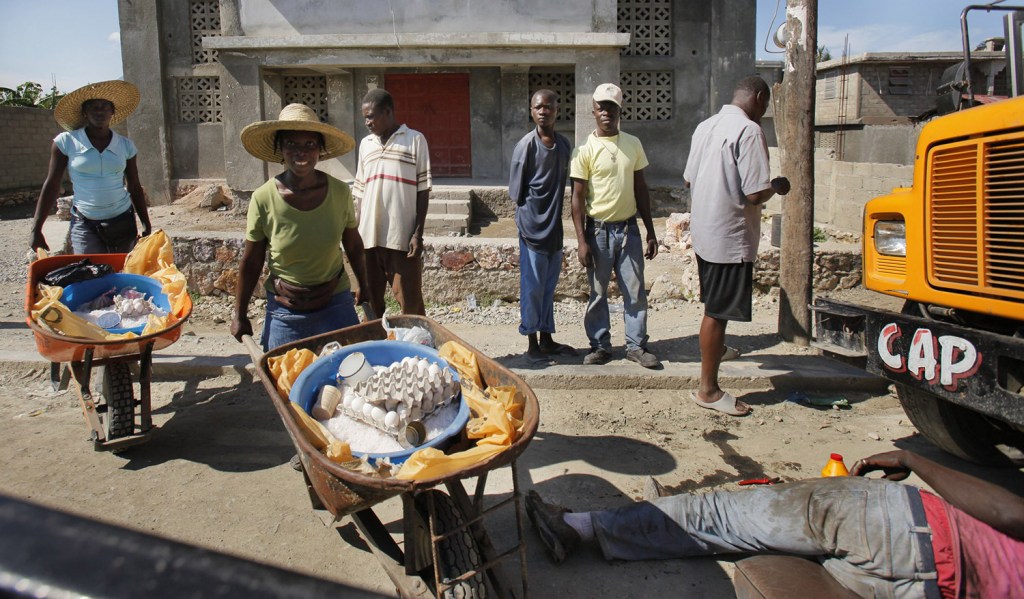CAP HAITIEN, Haiti – The numbers are slippery; information is hard to get a handle on.
According to Justinian Hospital’s medical director, the hospital saw 130 patients through the weekend who were earthquake victims. At the end of Tuesday, he didn’t have solid numbers for Monday or Tuesday.
There were reports that a gymnasium in the city was set up as a shelter for victims. There may be 300 people there. Or 1,500. Or nobody. And it’s unclear who’s in charge – if anyone is.
Amid the confusion, Nate Nickerson is trying to coordinate efforts to get aid – particularly U.S. medical personnel. Nickerson is executive director of Portland-based Konbit Sante, a nonprofit that has been working with partners to improve northern Haiti’s health care system at Justinian Hospital and at a clinic at Fort St. Michel, Cap Haitien’s poorest neighborhood.
Cap Haitien wasn’t hit by the quake, but survivors are coming here for medical treatment and to find shelter with relatives.
Nickerson is trying to line up medical volunteers with whom Konbit Sante has worked in the past, bringing in specific experts who know how the Justinian Hospital works.
The goal, he said, is to spread out their help over a longer period.
”The nerve center of the country was destroyed. They’re going to need long-term assistance, long-term support,” said Nickerson.
Tonight, Konbit Sante staff members will teleconference to determine exactly who should come down and when. Experts who are ready include a French team that has an orthopedic surgeon, an anesthesiologist and emergency room doctors; a Haitian-American psychiatrist from the Midwest; an obstetrician-gynecologist from Atlanta; and an East Coast pediatrician.
All have worked at the Justinian with Konbit Sante and know what the situation is like.
Since he arrived in Cap Haitien on Sunday, Nickerson has been meeting with local health and hospital officials. He has come up with a list of their needs and worked to secure those supplies – from shipments of gasoline to help run generators to orthopedic stabilizers for broken tibias.
He has been trying to get the officials to consider how Justinian could react to what he has warned could be many victims coming north from Port-au-Prince. He has been met with varying degrees of belief in how serious a problem refugees will actually present. Many in power just don’t see a surge coming.
There are several reasons for that, he said.
First, the scope of destruction from the earthquake is unprecedented. It’s hard for many people to comprehend.
Second, the central government was essentially destroyed, decentralizing control. People in the north who have never made decisions now have to, and they don’t have the resources to bring to bear on potential issues.
And the information systems that exist in the United States to help officials respond to a crisis just don’t exist in Haiti.
”People are making their best personal judgments. It’s not based on a lot of data, because there is no data,” Nickerson said.
Local authorities haven’t requested it, but Nickerson has been working with experts in disaster assessment from Johns Hopkins University in Baltimore, to tap into their expertise. He thinks their help will soon be appreciated by Cap Haitiens.
”I see some cracks in the armor there about the belief that nothing’s going to happen,” he said. ”People are coming in sufficient numbers that it’s beginning to dawn on people that it could be a major problem.”
Copy the Story LinkSend questions/comments to the editors.



Success. Please wait for the page to reload. If the page does not reload within 5 seconds, please refresh the page.
Enter your email and password to access comments.
Hi, to comment on stories you must . This profile is in addition to your subscription and website login.
Already have a commenting profile? .
Invalid username/password.
Please check your email to confirm and complete your registration.
Only subscribers are eligible to post comments. Please subscribe or login first for digital access. Here’s why.
Use the form below to reset your password. When you've submitted your account email, we will send an email with a reset code.